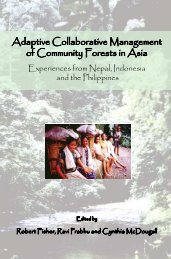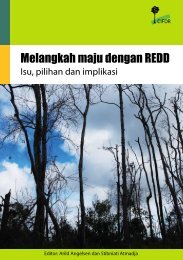A review of dipterocarps - Center for International Forestry Research
A review of dipterocarps - Center for International Forestry Research
A review of dipterocarps - Center for International Forestry Research
Create successful ePaper yourself
Turn your PDF publications into a flip-book with our unique Google optimized e-Paper software.
Seed Physiology 69<br />
Dipterocarp seed <strong>of</strong> the OLDA type has a shorter<br />
storage life than seed <strong>of</strong> crop species if compared at the<br />
same moisture content. Thus, it has been estimated that<br />
the relevant K E and, C W viability constants (which<br />
indicate seed longevity) are, respectively, only 6.4 and<br />
2.9 on the average <strong>for</strong> dipterocarp seed (Table 6),<br />
compared with 8.4 and 4.7 (Tompsett 1994) <strong>for</strong><br />
herbaceous crops. Further research is needed to extend<br />
these findings to other OLDA dipterocarp species.<br />
The stage <strong>of</strong> fruit development at harvest is important<br />
to ensure optimum desiccation tolerance, and<br />
consequently to ensure maximum storage potential.<br />
Further research is needed <strong>for</strong> <strong>dipterocarps</strong> in order to<br />
closely assess the relationship between harvest<br />
condition, postharvest handling, and desiccation<br />
tolerance.<br />
Studies are needed to increase knowledge <strong>of</strong> the<br />
optimum moisture and temperature conditions <strong>for</strong><br />
storage <strong>of</strong> recalcitrant seeds, employing controlled<br />
conditions. Especially, research is needed in relation to<br />
the chilling injury. Studies to quantify chilling damage<br />
in relation to moisture content are needed. Also, research<br />
is required to determine its relationship to underlying<br />
biochemical processes.<br />
Although the database DABATTS (Tompsett and<br />
Kemp 1996a, b) includes a large amount <strong>of</strong> previously<br />
unpublished in<strong>for</strong>mation on dipterocarp seed, a high<br />
proportion <strong>of</strong> its contents are the results produced by<br />
the authors. Unpublished in<strong>for</strong>mation from other sources<br />
needs to be databased, building on DABATTS and<br />
increasing the total sum <strong>of</strong> research results readily<br />
available.<br />
<strong>Research</strong> on the induction <strong>of</strong> flowering is necessary<br />
to improve knowledge <strong>of</strong> the causes underlying the<br />
irregular flowering <strong>of</strong> <strong>dipterocarps</strong>. Such research may<br />
provide artificial means <strong>for</strong> the induction <strong>of</strong> flowering<br />
in relation to breeding and to seed production in nonmast<br />
years.<br />
These approaches might with benefit be extended to<br />
other tropical tree families such as the Palmae and<br />
Sapotaceae.<br />
Relevant Institutions<br />
As described in Chapter 4 and above (in the work <strong>of</strong><br />
Sasaki, Mori, Tang, Tamari and Yap), Forest <strong>Research</strong><br />
Institute Malaysia (FRIM) has played a leading role in<br />
early dipterocarp seed research, particularly in the areas<br />
<strong>of</strong> germination ecology and storage research. Current<br />
work at FRIM on cryopreservation and seedling storage<br />
is referred to elsewhere. Over the last decade, the seed<br />
physiological studies at the Royal Botanic Gardens Kew<br />
have contributed basic knowledge, creating a firm<br />
foundation <strong>for</strong> practical recommendations. The Forest<br />
<strong>Research</strong> Centre, Sandakan, Malaysia, has a seed research<br />
laboratory constructed under an FAO aid programme and<br />
has undertaken significant dipterocarp research.<br />
In Thailand the Royal Forest Department’s ASEAN<br />
Tree Seed Centre, Muak Lek, has been involved in<br />
dipterocarp studies <strong>for</strong> a number <strong>of</strong> years and has good<br />
facilities; additionally, the central laboratory in Bangkok<br />
has an active research team on the topic.<br />
The Ecosystems <strong>Research</strong> and Development Bureau,<br />
Republic <strong>of</strong> the Philippines, is engaged in dipterocarp<br />
seed research, as are the Forest <strong>Research</strong> and<br />
Development Centre, the Biotechnology Centre and<br />
BIOTROP in Bogor, Indonesia. In India, research on<br />
biochemical aspects has been recently conducted at the<br />
High Altitude Plant Physiology <strong>Research</strong> Centre <strong>of</strong><br />
Garhwal University, Srinagar and the Forest <strong>Research</strong><br />
Institute, Dehra Dun has been involved in dipterocarp<br />
research in the recent past.<br />
In China, biochemical, ultrastuctural and<br />
physiological research on dipterocarp species has been<br />
per<strong>for</strong>med by staff <strong>of</strong> the Tropical Forest <strong>Research</strong><br />
Institute, Chinese Academy <strong>of</strong> <strong>Forestry</strong>, Guangdong.<br />
Although not involved in dipterocarp research, the<br />
Agriculture and Horticulture Department at Reading<br />
University, UK, is developing experience in the area <strong>of</strong><br />
tropical tree seed physiology. Other institutes have<br />
contributed in<strong>for</strong>mation in this field, but space available<br />
limits the numbers that can be included.<br />
Acknowledgements<br />
I thank the Royal Botanic Gardens Kew and the <strong>Center</strong><br />
<strong>for</strong> <strong>International</strong> <strong>Forestry</strong> <strong>Research</strong> <strong>for</strong> facilities and<br />
financial support<br />
References<br />
Berjak, P. and Pammenter, N.W. 1996. Recalcitrant<br />
(desiccation-sensitive) seeds. In: Olesen, K. (ed.)<br />
Innovations in tropical tree seed technology, 14-29.<br />
Danida Forest Seed Centre, Humlebaek.<br />
Chin, H.F., Hor, Y.L. and Mohd Lassim, M.B. 1984.<br />
Identification <strong>of</strong> recalcitrant seeds. Seed Science and<br />
Technology 12: 429-436.

















